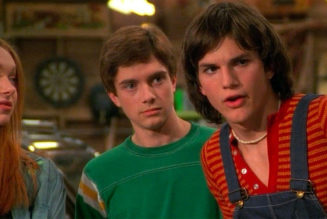
For Robin Pecknold, the music of Fleet Foxes has been a coming-of-age story. Pecknold founded the band in Seattle with childhood friend Skyler Skjelset when they were just about 20 years old, making unpretentious yet studied folk music and quickly signing with Sub Pop, who released the band’s pair of landmark 2008 releases, Sun Giant EP and their self-titled debut. Fleet Foxes hid their youth in plain sight, singing fables and channeling musical influences—like Judee Sill and the Byrds—that signaled nous and maturity. By 2011, a 25-year-old Pecknold began to show his age with the existential Helplessness Blues before disappearing and returning, at 31, with the more confrontational Crack-Up. Over the course of just a few releases, you could trace the arc of a songwriter shedding his past, finding his voice, and making more personal, complex, and, often, brooding music.
Shore, the fourth album from Fleet Foxes, brings gratitude back into the fold as Pecknold ascends to a graceful new plateau. The record’s mood is born largely from existential worries and the shadow of death, common concerns of Pecknold, who, now 34, has spent his career transforming anxiety into euphoria with towering, wall-of-sound choruses that belie the unease that inspires them. Career-making songs like the barnstorming “Helplessness Blues” were strengthened by a sense of overcoming despair, the feeling that we could all stare down obsolescence and say, That’s OK, I’m OK. Distress does not disappear entirely on Shore; it’s just accepted and worn, making for an album that is musically adventurous and spiritually forgiving, like it’s constantly breathing in fresh air.
On Shore, being grateful also means staying true to yourself and expressing what comes naturally. The album is bright and open, recalling, at times, the sunniness of their early songs, as well as the lighter moments of 2017’s Crack-Up, like “Fool’s Errand.” Instead of turning away from major-key melodies and blissful vocal harmonies, Pecknold leans into musical happiness on songs like “Sunblind” and “Young Man’s Game,” among the most jubilant entries in the band’s catalog. On the latter, Pecknold acknowledges the futility of faking it, singing: “I could worry through each night/Find something unique to say/I could pass as erudite/But it’s a young man’s game.” Reinvention, he implies, is deceitful; refinement and reflection, instead, are the paths to progress.
The idea of refinement is crucial to Fleet Foxes because, on the surface, the band sounds remarkably similar to how it did 12 years ago—without feeling like it’s retreading past sounds or themes. The resurgent Crack-Up demonstrated Pecknold’s evolution as a lyricist and songwriter, someone who could write stirring couplets while commanding extended metaphors and maintaining a degree of writerly distance. The album also contained more intricate arrangements, something that Pecknold has carried onto Shore, where the compositions are even more textured and buoyant. The new album, which Pecknold performs almost entirely by himself, is lively, as if he has broke open previous albums’ ambitious centerpieces (namely “The Shrine / An Argument” and “Third of May / Ōdaigahara”) and spread bits of those proggy endeavors across the whole record. “A Long Way Past the Past,” for instance, layers horns and a shifting guitar line beneath Pecknold’s harmonies and words about letting go of regrets. The crisp production details give Shore a natural feel, like the guitars, drums, and horns warble and float in the breeze alongside the birds, whose chirps lead “Maestranza.”
Elsewhere, there are explicit nods to contemporary classical music, as on “Jara,” which features hocketing by Meara O’Reilly, and “Cradling Mother, Cradling Woman,” which pairs O’Reilly with a snippet of Brian Wilson counting to resemble Philip Glass’ Einstein on the Beach and, in its sampling, also recalls the early work of Steve Reich. These moments don’t last long, serving as intros to their respective tracks, but they do signal Fleet Foxes’ continued willingness to experiment and venture beyond the confines of their reputation as a folk band whose music sounds as accessible and pleasant coming out of the speakers at Whole Foods as it does to Post Malone.
In composing some of the most vibrant music of his career, Pecknold also opens up as a writer, returning a bit to the nature imagery of his early work while turning his poeticisms into actual reflections of his thoughts. On the striking “Sunblind,” Pecknold shares his love for late songwriter heroes, including Richard Swift, John Prine, Bill Withers, Judee Sill, Elliott Smith, David Berman, and Arthur Russell. He mourns their loss and thanks them for leaving behind the gifts of their music, while also connecting their art with a life lived fully. “I’m gonna swim for a week in/Warm American water with dear friends,” Pecknold sings, alluding to Silver Jews’ 1998 opus and juxtaposing the jagged brilliance of Berman’s songs with the physical act of “swimming high on a lea in an eden.” “Sunblind” is made all the more exhilarating by how Pecknold arrays the darkness of American Water and the ocean’s vast beauty, acknowledging the former and embracing the latter. He returns to Berman on the sedate closer “Shore,” specifically recalling the day of the songwriter’s death. At the song’s end, Pecknold repeats, “Now the quarter moon is out,” again turning to the landscape in mourning.
Pecknold’s appreciation for life, his joy in spite or because of death, continues throughout Shore. Dark figures creep into the edges of the songs—e.g., “These last days/Con men controlled my fate” from “Maestranza”—as if their invitations to give into self-pity or hate are necessary to propel Pecknold toward music that’s rich and fulfilling without becoming overly sentimental. Every moment feels earned. The album’s climax arrives on the back half of the propulsive “Quiet Air / Gioia,” where Pecknold exalts, “Oh devil walk by/I never want to die.” It’s a consciously excessive declaration that does nothing to obscure our greatest fear, earnest and vulnerable in its very willingness to make the admission.
Fleet Foxes’ music has never been overly heavy, but each release brings expectations. Pecknold said that he wrote some of Helplessness Blues to have new material to play on tour with Joanna Newsom. And the tangled, prog-folk of Crack-Up, of course, came after a six-year hiatus, landing like a great unburdening of every idea gathered during Pecknold’s time as a student at Columbia University. Shore may be the first Fleet Foxes album without such a burdensome weight, arriving somewhat by surprise, without a long layoff, and into a cultural landscape that no longer foregrounds indie rock at the center of the musical universe. There’s a freedom to it that shows in the lithesome “For a Week or Two” and “Thymia,” or at the beginning of the record with the singing of Oxford student Uwade Akhere, suggesting that Pecknold does not feel the need to lead the way or come back immediately with some massive statement. Shore looks to the world and realizes there is already enough, as if staring into a darkness and responding with beauty, acceptance, and light.
Buy: Rough Trade
(Pitchfork earns a commission from purchases made through affiliate links on our site.)
Catch up every Saturday with 10 of our best-reviewed albums of the week. Sign up for the 10 to Hear newsletter here.










